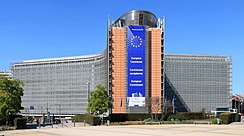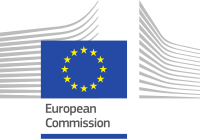
Back Europese Kommissie Afrikaans المفوضية الأوروبية Arabic الكوميسيون الاوروبيه ARZ Comisión Europea AST Avropa Komissiyası Azerbaijani Еўрапейская камісія Byelorussian Европейска комисия Bulgarian ইউরোপীয় কমিশন Bengali/Bangla Kengor Europa Breton Evropska komisija BS

The European Commission (EC) is the primary executive arm of the European Union (EU). It operates as a cabinet government, with a number of members of the Commission (directorial system, informally known as "Commissioners") corresponding to two thirds of the number of Member States, unless the European Council, acting unanimously, decides to alter this number.[1] The current number of Commissioners is 27, including the President.[2][3] It includes an administrative body of about 32,000 European civil servants. The commission is divided into departments known as Directorates-General (DGs) that can be likened to departments or ministries each headed by a Director-General who is responsible to a Commissioner.
Currently, there is one member per member state, but members are bound by their oath of office to represent the general interest of the EU as a whole rather than their home state.[4] The Commission President (currently Ursula von der Leyen) is proposed by the European Council[5] (the 27 heads of state/governments) and elected by the European Parliament.[6] The Council of the European Union then nominates the other members of the Commission in agreement with the nominated President, and the 27 members as a team are then subject to a vote of approval by the European Parliament.[7] The current Commission is the Von der Leyen Commission, which took office in December 2019, following the European Parliament elections in May of the same year.
- ^ European Union (2016). "Consolidated Version of the Treaty on European Union". EUR-Lex. Retrieved 22 October 2024.
- ^ European Commission (2006). How the European Union works: Your guide to the EU institutions (PDF). p. 20. ISBN 92-79-02225-3. Archived from the original (PDF) on 12 January 2012. Retrieved 4 December 2011.
Informally, the appointed members of the Commission are known as 'Commissioners'.
- ^ "How the Commission is organised". European Commission. Archived from the original on 11 November 2020. Retrieved 13 September 2019.
The Commission is steered by a group of 28 Commissioners, known as 'the college'.
- ^ "European Commission swears oath to respect the EU Treaties" (Press release). Brussels: European Commission. 3 May 2010. Archived from the original on 21 July 2019. Retrieved 1 June 2014.
- ^ "European Council Decision of 27 June 2014 proposing to the European Parliament a candidate for President of the European Commission". EUR-Lex. 1 July 2014. Archived from the original on 25 February 2021. Retrieved 13 July 2021.
- ^ Cite error: The named reference
Schütze 2012was invoked but never defined (see the help page). - ^ Treaty on European Union: Article 17:7
